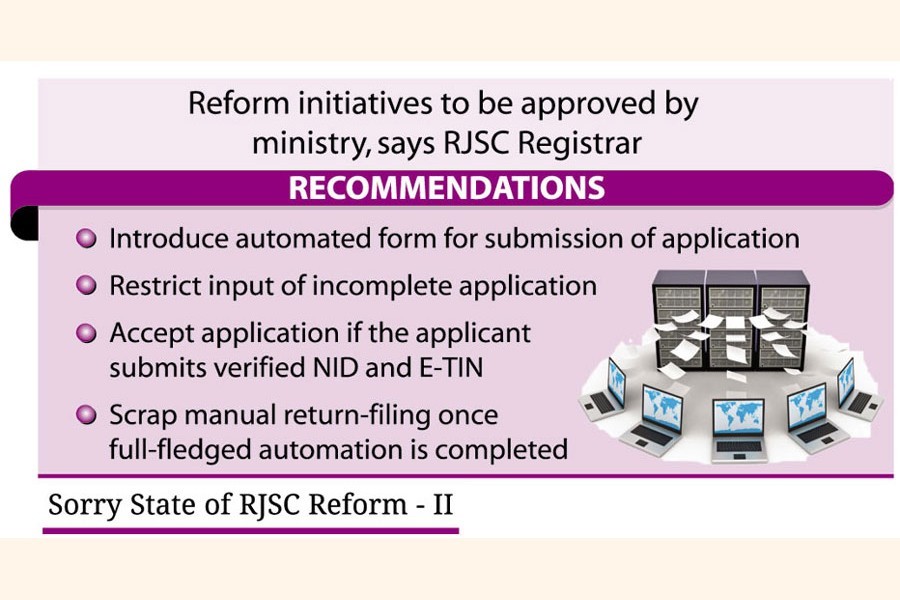An overhaul of the outmoded operational activity in company registration, name clearances, return filing, winding up and other major requisite services gets underway, but inches forward thus far.
The government made the move for reform of the Registrar of Joint Stock Companies and Firms (RJSC following wide-spread allegations of complex company- registration process and other sorts of service delivery from the regulator that cause time and cost escalation of doing business.
Recently, a reform body of the Ministry of Commerce has dug out flaws in service-delivery process of the RJSC. Reviewing online services of the entity, the MoC committee, headed by additional secretary Abdus Samad Al Azad, put forward a set of recommendations for simplifying its services to make those hassle-free.
The panel submitted its report to the commerce secretary with its detailed recommendations for upgrading services of the regulatory body at the nodal point of national economy.
In its bid to diagnose the drawbacks on the registration function in the fast-changing world context, the committee has found most start-ups willing to register with the RJSC gather in front of its computer operators with application, then visit inspector to assistant registrar.
The committee proposed introducing an automated form for submission of application. The applications will be received by computer operators on the basis of random selection to send to the examiner in next three days.
And the examiner would be the last step for sending registration proposal to the assistant registrar.
To fully automate the company- registration process, the committee has asked for restricting the input of incomplete application, accommodating required field to submit, reviewing and completing registration of company.
It also recommended accepting application if the applicant has a verified National Identification Number (NID) and Electronic Taxpayer Identification Number (TIN).
For foreign entrepreneurs, the reform body proposed that bank would have to furnish encashment information on a mandatory basis to RJSC's designated e-mail, registrar's e-mail and Bangladesh Bank.
In case of society, foundation or trust registration, it recommends avoiding duplication on registering with both RJSC and the ministry of social welfare, in some cases, through harmonization of the law.
Through discussion with the RJSC, the committee members found 90 per cent of the returns of the companies faulty.
One of the reform provisos calls for preparing a full-fledged online form and getting undertaking from the company representatives on submission of accurate and complete return.
To trim the discretionary power, the reformers suggest that the examiner follow risk-assessment method to verify return and dispose it.
The reform package also includes scrapping the manual return-filing system once the full-fledged automation is completed.
However, talking to the FE correspondent, RJSC registrar Sheikh Shoebul Alam said they would have to keep both manual and online return-submission process simultaneously as many of the users have yet to be digitized.
He speaks of RJSC plan to make the process paperless gradually so that visitors can get services from anywhere.
The existing system requires the company representatives to make physical visit after online application to transfer share.
They have to sign documents and submit supporting documents by visiting in person the RJSC office.
In this matter, the MoC committee recommends selecting share-transfer application on random basis and then sending to the examiner. After completion of scrutiny, the official concerned will give scheduled dates with option for physical visit of the person willing to transfer share.
It also has proposed ensuring application submission after inserting details in the mandatory fields on a prescribed form, digitizing the biometric system, introducing mobile notification, system-generated report, interactive dashboard etc.
For winding up company, the committee proposes submission of application online.
Bringing consistencies in law, rules and business process, establishing digital achieves, investing in logistics and manpower are also in the package of dos meant for a thorough overhaul of the time-worn regulator to make it suit the latest milieus.
And last, but, by no means, the least, in the reform recipe is also 'business process re-engineering' to be executed with the support of USAID in line with the recommendations.
Abdus Samad Al Azad says already some of the recommendations are being implemented under the USAID project.
"However, each of the reform initiatives will have to be approved by the Ministry of Commerce to crosscheck the process in a bid to avoid any further complexities," he says about the modus operandi they follow.
Service-seekers will be able to track the progress of their application on the dashboard, he adds about the progress thus far made.


